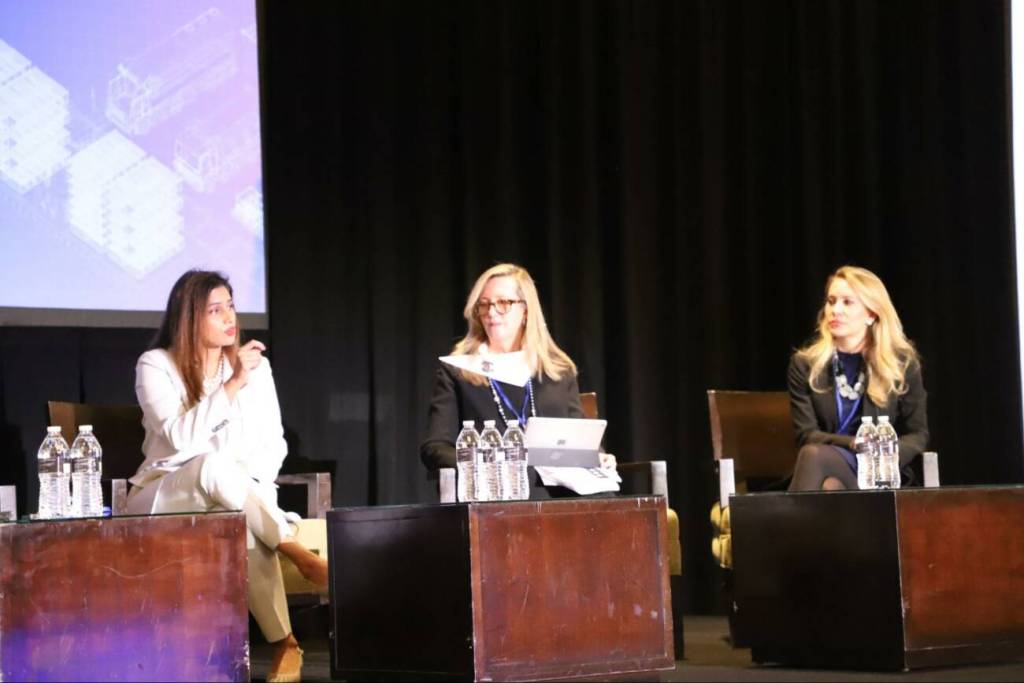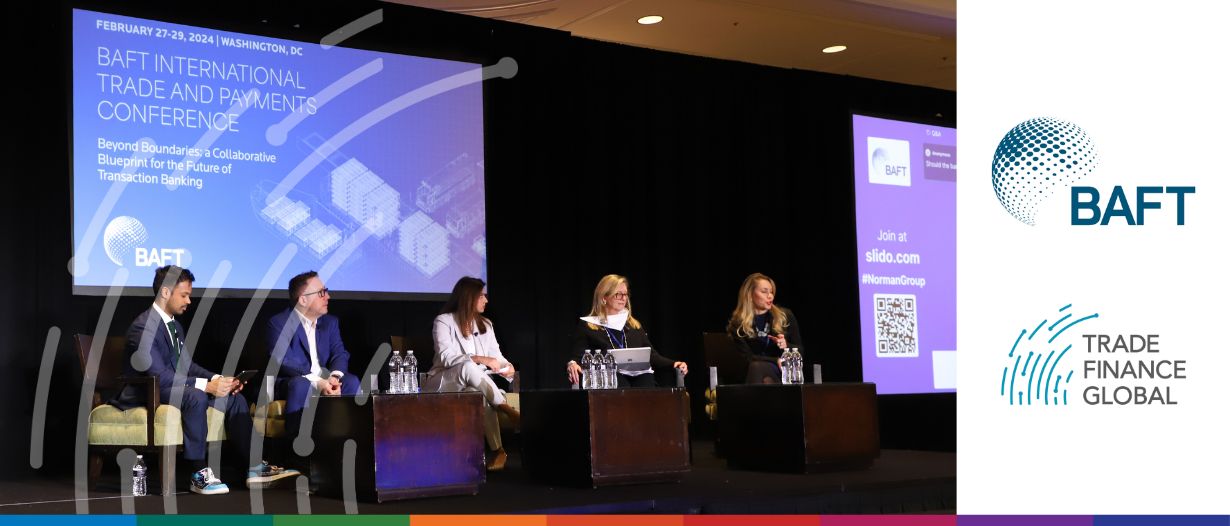Estimated reading time: 8 minutes
The trade and payments industry is at a crossroads in its digitalisation journey. Recent years have shown a clear shift towards a more digital world, but there has been asymmetric adoption across the industry, uneven regulation, unintended consequences, winners and losers.
While the progress is encouraging, the next steps are marked by the need for interoperability and uniform adoption of standards such as the full adoption of ISO 20022 by November 2025.
BAFT’s inaugural 2024 ‘International Trade and Payments’ conference covered many topics, but digitalisation and the transformation of trade and payments shone brightly. Bringing together over 200 industry participants, it was clear that the evolution of the trade and payments industry was moving ahead, and the need to talk about both, in sync, was tantamount.
During the conference, the industry heard from trade and payments leaders:
- Avanee Gokhale, Global Head for Trade Strategy at Swift,
- Renata Vilanova Lobo, Managing Director and Global Clearing Head of Payments at J.P. Morgan,
- Gwynne Master, Managing Director and Head of Lending, Trade and Working Capital at Lloyds Bank,
- Marc Recker, Global Head of Product, Institutional Cash Management at Deutsche Bank,
- Deepesh Patel, Editorial Director, Trade Finance Global (moderator).
With real collaboration, trade and payments can become cheaper, more efficient, and more accessible worldwide. The industry can see the path forward, but much work must be done before claiming victory.
Digitalisation and standardisation in trade and payments
The journey toward a fully digital and interconnected global trade ecosystem is complex, particularly given the fragmented nature of existing digital platforms and the diverse current standards.
In the past two years alone, Marco Polo, we.trade and Contour have collapsed, leaving the digital trade world searching for longevity solutions.
This fragmentation poses significant challenges to the seamless execution of international transactions, leading to inefficiencies, increased costs, and reduced reliability.
Gokhale said, “We envision the ecosystem will continue to be multi-banked, multi-network, multi-platform, multi-solution. In order to have operational efficiencies, there must be interoperability between the various networks.”
Adopting ISO 20022 is critical to realising this vision, and promises enhanced data quality and operational efficiencies by standardising financial messages globally.
ISO 20022 is the next evolution in financial messaging standards, characterised bwlay adopting a unified language and comprehensive, structured data. Swift is actively transitioning its payment and cash management messages from the existing MT format to the ISO 20022 standard.
ISO 20022 sets a new benchmark in financial communication, offering unparalleled data richness and interoperability that streamline global transactions, potentially reducing costs and settlement times. Unified by ISO 20022, stakeholders across the trade and payments landscape can achieve seamless data exchanges, minimising errors and delays and fostering innovation through enriched, actionable insights.
This digital evolution also facilitates a more inclusive global trade system, where businesses of all sizes can participate on an equal footing, driving economic development and paving the way for a future where global trade is more integrated, resilient, and accessible to all.
The role of banks in facilitating smoother trade transactions
Banks have been instrumental in adopting new technologies and advocating for the standardisation of practices that enhance the efficiency and security of global transactions.
However, as the complexity of global trade increases, it is apparent that the challenges extend beyond the capabilities of banks alone; there must be a collaborative effort involving carriers, shippers, platforms, fintechs, and legislation.
Recker said, “I believe the biggest problem that we have in cross-border payments is the end-to-end cost. If we collaborate with regulators to get more harmonised frameworks, the creation of certain market utilities will help us to bring the cost base down as well.”

By fostering collaboration among this array of stakeholders, like the Lloyds Bank and Enigio partnership, the industry can work towards creating a more unified and efficient infrastructure that addresses the operational, regulatory, and cost-related challenges at hand.
Furthermore, legislation can pave the way for adopting new technologies and practices by setting clear guidelines and frameworks that ensure security, privacy, and trust among all parties involved.
Trust is becoming increasingly important amid the current widespread global uncertainty.
Opportunities and challenges in decoupling supply chains
The ongoing geopolitical tensions and macroeconomic instability have catalysed a decoupling of supply chains.
After slowly recovering from the nearshoring and supply chain volatility that happened as a result of COVID-19, the Russian invasion of Ukraine and the Red Sea attacks quickly caused another chain of disruption.
This trend is reshaping the international trade landscape as the vulnerability of the global supply networks to political, economic, and social upheavals becomes more apparent.
As countries and companies grapple with these challenges, the pursuit of resilience has led firms to reevaluate their dependency on distant suppliers and adopt a more localised and diversified sourcing strategy.
The complexities introduced by geopolitical tensions and economic uncertainties demand a coordinated response from all stakeholders involved in international trade.
Master said, “Regulatory requirements scream out for the need for collaboration. If we look at how we’ve handled KYC, AML, ESG, we’ve missed a beat in terms of collaborating as an industry to deliver best-in-class outcomes.”
This reflects a broader recognition that navigating the challenges of decoupling and building more resilient supply chains cannot be achieved in isolation, it requires a concerted effort from businesses, governments, and international bodies.
In this context, the shift towards decoupling and the search for alternative supply chain configurations are intertwined with the need for enhanced collaboration across the board.
Attempting to push back against the decoupling trend, (including the fact that a mere 2.1% of bills of lading and waybills in container trade were digital in 2022,) Swift, DCSA, BIMCO, FIATA, and ICC came together to create the FIT Alliance to secure a collective commitment to spearhead digital transformation, beginning with the implementation of electronic Bills of Lading.
Enhancements in cross-border payments
Efforts to make cross-border payments faster, cheaper, and safer have been a significant focus for the financial industry, particularly in alignment with the G20 agenda to make trade cheaper, faster, more accessible and transparent.
These efforts are driven by a shared recognition of the existing shortcomings in the international payments system, often criticised for its lack of speed, high costs, and insufficient transparency.

Lobo said, “There has been a lot of action among banks exploring how we can deliver faster, cheaper, safer payments with more transparency. Although there has been a lot going on behind the scenes, we have yet to see many concrete results towards enhancing cross-border payments.”
In 2023, J.P. Morgan partnered with ClearEye to enhance their digital trade solutions for their global clients. ClearEye’s technology to automate labour-intensive tasks such as KYC and TBML checks, and distributing this among J.P. Morgan’s global network is an example of the behind-the-scenes collaboration that will eventually pay dividends for the industry.
This reflects a collective acknowledgement of the gap between the aspirations of the FSB’s G20 roadmap for enhancing cross-border payments, highlighting the challenges of achieving tangible improvements.
Despite the slow pace of visible progress, there has been considerable effort behind the scenes to address these challenges.
Levelling the uneven playing field
One of the key initiatives has been the push towards adopting new messaging standards like ISO 20022, which aims to reduce the friction in payment processing by ensuring more structured, harmonised and comprehensive data accompanies each transaction.
ISO 20022 facilitates more interoperable cross-border payments, reducing data translation and truncation issues, and offers flexibility in using different technical syntaxes like XML and JSON.
This standard is expected to minimise errors, reduce the need for manual intervention, and enhance the efficiency of cross-border payments.
Through standardisation, automation, and collaboration, there is a path forward to creating a global payments landscape that is faster, cheaper, and safer.
By November 2025, it’s estimated that around 80% of RTGS volumes will be processed via ISO 20022, with major payment market infrastructures worldwide adopting the standard.
But it takes the entire ecosystem to embrace these changes. While large banks need to take the lead in adopting ISO 20022, small banks are equally important in achieving true interoperability.
A more standardised industry is a more efficient and equal industry, and that is what digitalisation is ultimately aiming for.
Confronted with the dual challenges of advancing digitalisation and navigating the intricacies of increasingly decoupled supply chains, the path forward requires collective action, innovation, and unwavering commitment to global standards.
The complete transition to interoperability will not be easy, given the complexity and reach of the industry. However, the expansive networks can be utilised to push the ISO 20022 message.
BAFT’s ISO 20022 whitepaper is an important starting point for the industry. Sharing lessons learned, along with the experiences and challenges, will only further the adoption of messaging interoperability.
By embracing transformative changes and fostering strategic alliances, the sector can surmount current challenges, setting the stage for a future where trade and payments are not only more efficient and secure but also universally accessible.
This vision, though ambitious, is within reach through collective determination and shared commitment to excellence and inclusivity.
BAFT, the leading global financial services association for international transaction banking, helps bridge solutions across financial institutions, service providers, and the regulatory community that promote sound financial practices enabling innovation, efficiency, and commercial growth. BAFT engages in a wide range of topics affecting transaction banking, including trade finance, payments, and compliance.























